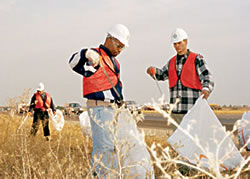BUSINESS
Super (Clean) Highway
February, 2007 - Issue #28
 Copyright California Department of Transportation |
More than 260,000 bags of trash are collected every year by the maintenance crew from the California Department of Transportation. Stacked end-to-end, the collected trash would reach from Bakersfield to Disneyland, said Steve Mellinger, the Adopt-A-Highway coordinator for the north and west Los Angeles and Ventura County. To help with the cleanup, over 50 percent of our highways have been adopted by individuals, businesses and community groups, saving California taxpayers approximately $14.5 million a year.
"Everyday someone is picking up trash somewhere," Mellinger said. "We all love to see beautiful freeways, [but] the priority is to keep the freeways safe and improve the transportation system to relieve congestion. Safety comes first."
The Adopt-A-Highway program began in Texas with California becoming the 20th state to implement the volunteer program. Most of the states are now on board. Litter is not only an eyesore, it also a safety and health issue. If you happen to walk along the beach after a rainfall, you'd be disgusted at the amount of garbage that washes up on our shorelines. Every year CalTrans comes out to the Santa Clarita area to clean out the debris clogging the storm drains using a vacuum-type system.
"[What] ends up on the roadway makes it to our storm system," Mellinger said.
CalTrans workers and volunteers literally put themselves at risk on our busy highways just to pick up the garbage that people can't seem to hang onto until they find a trash can. And it's not only fast food wrappers. Some of the more interesting garbage that has been retrieved include airplane and boat parts and, no kidding, kitchen sinks.
| "Some of the more INTERESTING GARBAGE that has been retrieved include airplane and boat parts and, no kidding, KITCHEN SINKS" |
As freeways are redesigned and widened, other litter and anti-graffiti measures are being put in place. Senior Landscape Architect Ed Siribohdi said CalTrans is using a lot more greenery on freeway off and on ramps including trees and ice plants and erecting graffiti-resistant walls. The idea, Siribohdi said, is to make the areas more open and low maintenance. The recently completed Interstate 5 in Orange County near Disneyland is a good example of the new design plans. Adopt-A-Highway volunteers can also sign on to plant and weed the off and on ramps with CalTrans' Beautification Program.
Funding for freeway improvements and clean-up comes from the gasoline tax, but much of the funding is diverted for safety issues such as potholes and signal lights.
Many boomers remember the commercials in the '60s that show a happy family motoring down a highway and throwing their trash out the window only to have it land at the feet of Iron Eyes Cody in his full Native American regalia. A close-up of Iron Eyes shows a tear running down his cheek. The "Keep American Beautiful" campaign, initiated by Lady Bird Johnson, got a lot of attention. The "Don't Trash California" ad campaign is gaining strength with television commercials and billboards while officials visit local safety fairs and elementary schools.
"We live in such a beautiful part of the United States," Mellinger said. "We do have a lot of commuters and drivers here. We are so spread out in Los Angeles, and more and more people are seeing the benefits of using the different transportation [such as Amtrak]. We ask everyone to just do their part and think twice before they throw litter out of their car."
|
||||||||||||||||||||||||||||





